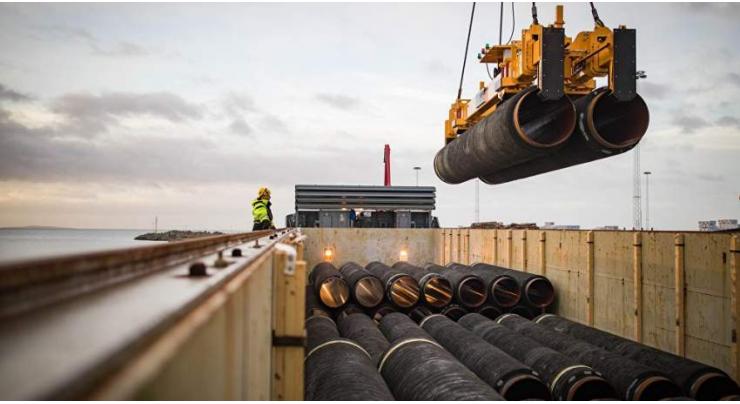
OMV Chief Rules Out EU Gas Import Rules To Raise Price Tag For Nord Stream 2
Umer Jamshaid Published February 19, 2019 | 12:36 AM

A change in EU gas import rules will not delay or raise the cost of the Nord Stream 2 pipeline, the chief executive of Austria's OMV, which has a stake in the project, said in an interview out Monday
MOSCOW (UrduPoint News / Sputnik - 19th February, 2019) A change in EU gas import rules will not delay or raise the cost of the Nord Stream 2 pipeline, the chief executive of Austria's OMV, which has a stake in the project, said in an interview out Monday.
Rainer Seele said speculations about the project's higher price were "nonsense," according to the German newspaper Frankfurter Allgemeine.
He emphasized that Germany had lawfully granted a permit to extend the nearly 746-mile-long natural gas pipeline into its territory and would not have the project torpedoed months before it is completed.
The European Commission announced last week a provisional deal to amend the bloc's rules governing the internal gas market to apply them to pipelines from other countries. This includes making sure that a gas producer is not also the pipeline's majority owner.
Seele rebuffed criticism by Poland and Ukraine that building a pipeline across the Baltic Sea would cement Europe's dependence on Russia.
He said the two were merely concerned about missing out on transit duties.
The pipeline will have an annual capacity of 1.9 trillion cubic feet. Together with the already operating Nord Stream, Europe is expected to import double that amount of natural gas from Russia.
This will prevent Kiev and Warsaw from uncontrollably raising tariffs on gas transit through Jamal and Druzhba pipelines, he said, adding that the "times of Ukraine as a monopoly" were over.
The OMV chief warned against mixing the EU energy policy with the peace process in Ukraine. He said Russia had been a reliable gas supplier for the past 50 years and its relationship with the European Union based on supply and demand was "clearly balanced."
The European Union agreed last week to extend sanctions on Russia over lack of progress in implementing a ceasefire deal in eastern Ukraine, despite repeated protests from Moscow that it was not a party to the conflict between the Ukrainian government and local militias.
Related Topics
Recent Stories

Bismah Maroof announces immediate retirement from international cricket

Malala expresses unwavering support for Gaza people

Selection committee dissolved over Pakistan women cricket team's poor performanc ..

Punjab CM Maryam Nawaz in police uniform at Chung police center

Currency Rate In Pakistan - Dollar, Euro, Pound, Riyal Rates On 25 April 2024

Today Gold Rate in Pakistan 25 April 2024

Mired in crisis, Boeing reports another loss

Session Awarding Ceremony 2024 held at Cadet College Muzaffarabad

Austrian ski great Hirscher to make comeback under Dutch flag

Pakistan, Japan agrees to convene 'Economic Policy Dialogue'

FM Dar conveys deepest sympathy on torrential rains devastation in UAE

Spain PM Sanchez says weighing resignation after wife's graft probe
More Stories From Business
-
Gold rates up by Rs500 per tola to Rs242,500
1 hour ago -
Tokyo stocks end lower after Meta results
1 hour ago -
EXCHANGE RATES FOR CURRENCY NOTES
3 hours ago -
Foreign exchange rates
3 hours ago -

Currency Rate In Pakistan - Dollar, Euro, Pound, Riyal Rates On 25 April 2024
5 hours ago -

Today Gold Rate in Pakistan 25 April 2024
5 hours ago
-
Meta profits soar but costs of AI cause worry
6 hours ago -

Mired in crisis, Boeing reports another loss
14 hours ago -

Pakistan, Japan agrees to convene 'Economic Policy Dialogue'
14 hours ago -

British-Pakistani firm unveils $35 million luxury apartments for overseas Pakistanis in Islamabad
15 hours ago -

European stocks lose momentum after global rally
15 hours ago -

New pulses varieties imperative to cater domestic food requirements: Dr Khalid Hasan
16 hours ago












